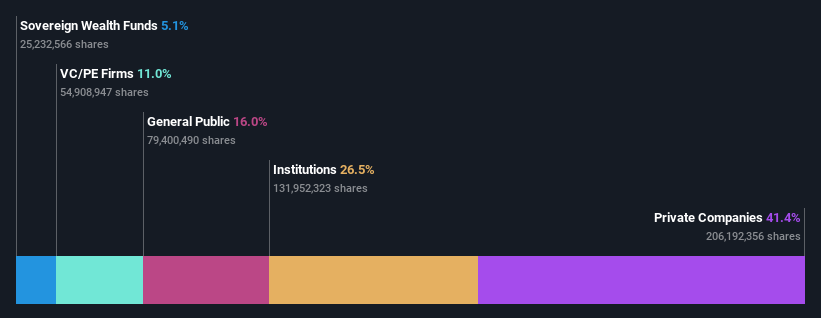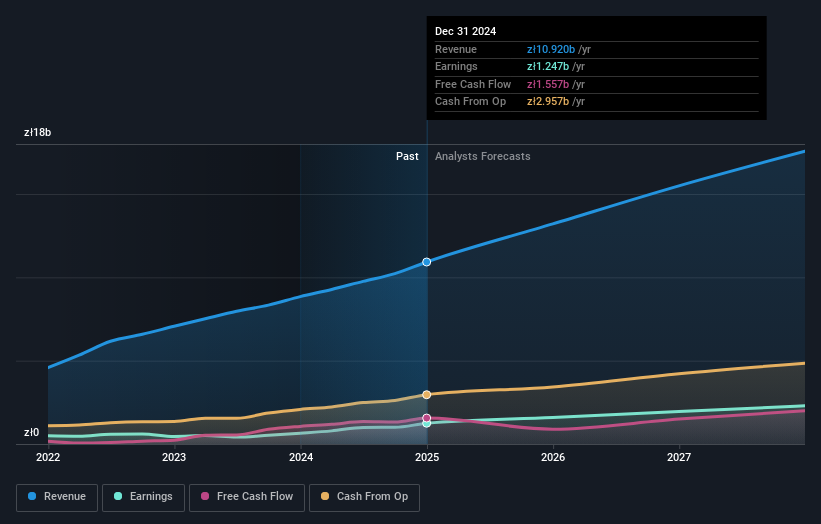- Netherlands
- /
- Logistics
- /
- ENXTAM:INPST
Institutions profited after InPost S.A.'s (AMS:INPST) market cap rose €597m last week but private companies profited the most

Key Insights
- The considerable ownership by private companies in InPost indicates that they collectively have a greater say in management and business strategy
- 52% of the business is held by the top 3 shareholders
- 27% of InPost is held by Institutions
A look at the shareholders of InPost S.A. (AMS:INPST) can tell us which group is most powerful. We can see that private companies own the lion's share in the company with 41% ownership. Put another way, the group faces the maximum upside potential (or downside risk).
Private companies gained the most after market cap touched €7.2b last week, while institutions who own 27% also benefitted.
Let's take a closer look to see what the different types of shareholders can tell us about InPost.
View our latest analysis for InPost

What Does The Institutional Ownership Tell Us About InPost?
Institutions typically measure themselves against a benchmark when reporting to their own investors, so they often become more enthusiastic about a stock once it's included in a major index. We would expect most companies to have some institutions on the register, especially if they are growing.
As you can see, institutional investors have a fair amount of stake in InPost. This suggests some credibility amongst professional investors. But we can't rely on that fact alone since institutions make bad investments sometimes, just like everyone does. It is not uncommon to see a big share price drop if two large institutional investors try to sell out of a stock at the same time. So it is worth checking the past earnings trajectory of InPost, (below). Of course, keep in mind that there are other factors to consider, too.

InPost is not owned by hedge funds. Our data shows that PPF Group N.V. is the largest shareholder with 29% of shares outstanding. With 13% and 11% of the shares outstanding respectively, A&R Investment Limited and Advent International, L.P. are the second and third largest shareholders.
A more detailed study of the shareholder registry showed us that 3 of the top shareholders have a considerable amount of ownership in the company, via their 52% stake.
While studying institutional ownership for a company can add value to your research, it is also a good practice to research analyst recommendations to get a deeper understand of a stock's expected performance. Quite a few analysts cover the stock, so you could look into forecast growth quite easily.
Insider Ownership Of InPost
The definition of company insiders can be subjective and does vary between jurisdictions. Our data reflects individual insiders, capturing board members at the very least. The company management answer to the board and the latter should represent the interests of shareholders. Notably, sometimes top-level managers are on the board themselves.
Most consider insider ownership a positive because it can indicate the board is well aligned with other shareholders. However, on some occasions too much power is concentrated within this group.
Our data cannot confirm that board members are holding shares personally. It is unusual not to have at least some personal holdings by board members, so our data might be flawed. A good next step would be to check how much the CEO is paid.
General Public Ownership
The general public, who are usually individual investors, hold a 16% stake in InPost. While this size of ownership may not be enough to sway a policy decision in their favour, they can still make a collective impact on company policies.
Private Equity Ownership
Private equity firms hold a 11% stake in InPost. This suggests they can be influential in key policy decisions. Some investors might be encouraged by this, since private equity are sometimes able to encourage strategies that help the market see the value in the company. Alternatively, those holders might be exiting the investment after taking it public.
Private Company Ownership
It seems that Private Companies own 41%, of the InPost stock. It's hard to draw any conclusions from this fact alone, so its worth looking into who owns those private companies. Sometimes insiders or other related parties have an interest in shares in a public company through a separate private company.
Next Steps:
I find it very interesting to look at who exactly owns a company. But to truly gain insight, we need to consider other information, too. For example, we've discovered 1 warning sign for InPost that you should be aware of before investing here.
Ultimately the future is most important. You can access this free report on analyst forecasts for the company.
NB: Figures in this article are calculated using data from the last twelve months, which refer to the 12-month period ending on the last date of the month the financial statement is dated. This may not be consistent with full year annual report figures.
New: AI Stock Screener & Alerts
Our new AI Stock Screener scans the market every day to uncover opportunities.
• Dividend Powerhouses (3%+ Yield)
• Undervalued Small Caps with Insider Buying
• High growth Tech and AI Companies
Or build your own from over 50 metrics.
Have feedback on this article? Concerned about the content? Get in touch with us directly. Alternatively, email editorial-team (at) simplywallst.com.
This article by Simply Wall St is general in nature. We provide commentary based on historical data and analyst forecasts only using an unbiased methodology and our articles are not intended to be financial advice. It does not constitute a recommendation to buy or sell any stock, and does not take account of your objectives, or your financial situation. We aim to bring you long-term focused analysis driven by fundamental data. Note that our analysis may not factor in the latest price-sensitive company announcements or qualitative material. Simply Wall St has no position in any stocks mentioned.
About ENXTAM:INPST
InPost
Operates as an out-of-home e-commerce enablement platform providing parcel locker services in Poland and other European countries.
Undervalued with high growth potential.
Market Insights
Community Narratives



